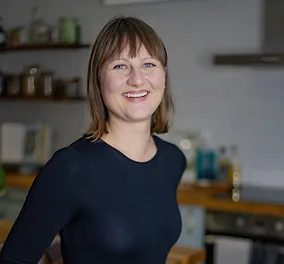
Catherine Nash, Team Lead Gastroenterology Dietitian at Oxford University Hospitals NHS Trust and co-founder of Oxford Gastro Dietitians, explores the emerging question in the dietetic management of IBS: group sessions or one-on-one consultations for managing IBS? With a pragmatic scenario of time constraints and a bustling waiting room, Catherine delves into the dichotomy of efficiency and personalised care. Group sessions offer cost-effective solutions, but one-on-one consultations provide tailored, in-depth approaches. Catherine suggests a hybrid model, blending group dynamics with personalised attention, to strike a balance that maximises value for practitioners and clients. Through evidence-based insights, she challenges practitioners to navigate this delicate balance in the evolving landscape of dietetics.
I want to start by inviting you to consider a scenario… If you had an hour left of your day and 6 patients in the waiting room… would you rigorously evaluate one client or would you invite them all into your office at the same time? Let’s face it; we’re all immediately tempted to avoid the disappointment of our clients as they are turned away. So why not invite everyone in? That way, we could still generate income, and keep everyone happy enough? Being a freelance practitioner and working for the NHS, I have experience from a wide-view lens and I’m excited to share with you what I have learnt.
We have businesses to run and targets to meet. Doesn’t it seem reasonable to relay the same consistent information across as many clients as possible if we have that opportunity?
First of all, put yourself in your clients’ shoes … if this was you looking for support and advice. What qualities would you like to see in a service offered to you? Would you prefer a group session or a 1:1? What is your ideal service as a patient? Why would you choose this service? Now switch back to being the service delivery provider. Can this ideal service exist? Probably… although most likely at a significant cost either financially and/or to precious time.
These days time seems to be a precious commodity on the x axis, with income being on the y.
It’s easy to assume that the more time you spend on a client the more income you need to make from them to make your business successful. Now, as a freelancer, this is achievable by charging more for your time although it may not be ideal if you want full clinics. For the NHS this is a little trickier. With increasing demand for gastroenterology dietetic services, group clinics can help to cope with demand1. Group sessions have shown themselves to be an efficient design commonly used for quality improvement2. Without utilising methods such as this we could hit a ceiling of pressure on the ability to access more time. So, to evaluate, group sessions appear to be a cost-efficient saviour to probably all avenues of dietetics. We should ask ourselves, however at what alternative cost?
We enjoy the thrill of the chase in teasing out our clients’ barriers to change and negotiating ways around their personal obstacles.
It’s at the core of our training, a skill that the dietetic profession prides itself in. I’m talking about communication skills of course. You can’t beat the satisfaction of both parties from a constructive 1:1 consultation… the ability to meet your client face-to-face, build rapport, and have thorough discussion, making them feel like they have received the focus and attention they deserve from a healthcare professional. However, we have been propelled through a fast changing, post–covid, ‘digital first’ era. Virtual and telephone consultations are now heavily utilised by both the NHS and freelancers. Whilst there are many positive outcomes3, lack of client interest in telehealth, internet access and inability to take in person anthropometrics have been found to be significant barriers in providing it exclusively4.
Clients want to know they are listened to, with full focus, and with a human understanding.
Active listening and motivational interviewing are arguably two of the most effective skills we have to engage our clients and build a positive therapeutic relationship5,6. Whilst more evidence is required to determine the influence this has upon client’s health outcomes7, a personalised, patient-centred approach to nutrition assessment and intervention is both a preference of our clients, and identified as the best way of providing nutritional counselling8,9. This preference has been evidenced in clinical practice; a study looking at FODMAP group sessions found that, after careful cohort selection, around one third of clients expressed that they would have preferred a 1:1 consultation10. For us, the clinician, balancing the needs of multiple participants in a group setting can be a daunting challenge to the inexperienced. There can be a reluctance to digress from a structure in order to keep to time. In turn, this may influence the depth of discussion during the session and the ability for us to focus on our client’s individual needs and nurture their personal growth. When constructing or delivering a group session careful attention is required to ensure that valuable interpersonal relationships are not lost in the process9.
The social connection created from a group community can be encouraging for people with IBS; a condition which is associated with feelings of isolation11
Some clients will thrive on the sense of community, exposure to different perspectives may provide insights and strategies they had not considered before. We know that everyone is individual and there will be clients who suffer from social anxiety, are uncomfortable with discussing personal health details in a group setting, or perhaps require a little more help with applying advice to practice. Of course, we should always prioritise making a service accessible for vulnerable client groups. Whilst those who feel comfortable in a group setting are easily identified in the freelance world (they would choose and pay for the preferred service), identifying clients who would not engage in this setting can be a challenge within the NHS. Often here referrals don’t regularly include personal preferences or our client’s personality. Most of the time we have not personally communicated with our client before their appointment. Having a clear referral process which is re-evaluated regularly, and keeping the client informed of their choices, is key in this setting.
Which brings me onto my final take away. Whether you intend to run a group session in the NHS, or as a private practitioner, measuring outcomes is paramount to its success.
When setting up a group session it is good practice to define the purpose of your session, the objectives, expected outcomes and also carefully consider your target audience. What can sometimes be forgotten in the hype of setting up a new group session is the infrastructure to evaluate that service. Choose how to measure the outcomes wisely and use relevant quality improvement guidelines for support. By putting the work in now, you set yourself up with a solid structural foundation to work upon.
After all, good quality outcomes can be used, in turn, to contribute back to your success.
For example, measured outcomes could be used to advance evidence-based working, contribute to proving the value of dietetics, and promote your service. Ultimately, choosing between group and 1:1 consultations depends on a balance of client preferences and the level of personalisation needed to make it a successful encounter. Each format has its strengths, and the optimal choice may vary from person to person.
What is my personal opinion? I believe the time is to look towards integrating the best of both worlds, a hybrid group, if you will…
If you have information which remains consistent among clients, it makes sense to use all of the benefits and interactivity of a group session with the digital tools we have been provided. However, to appreciate clients’ individuality and satisfy their desire for individual focus, why not add some benefits to your package that can be tailored and individualised? I think this approach could provide the most value for both the dietitian and the client in times of pressure. Here at Oxford Gastro Dietitians, we are currently running gut health workshops for those who may or may not have IBS but are wanting to focus on building up their gut health. We have collaborated with a reflexologist, breathwork coach and hypnotherapist along with a pilates teacher to deliver our ‘love your gut, love yourself’ workshops (a four-part series of workshops over the course of four weeks). Within these we discuss the latest information on the gut microbiome, talk about all the different probiotics, gut health supplements and which may be beneficial, or not, and also common gut concerns and some recommendations for those (such as bloating, constipation and diarrhoea). We also incorporate movements, breathwork, reflexology and meditations to further improve their gut health and symptoms. We have had really good feedback so far.
Have you thought about running group sessions for the dietetic management of IBS? We’d love to hear from you so please do comment below and let us know your experiences so far.






